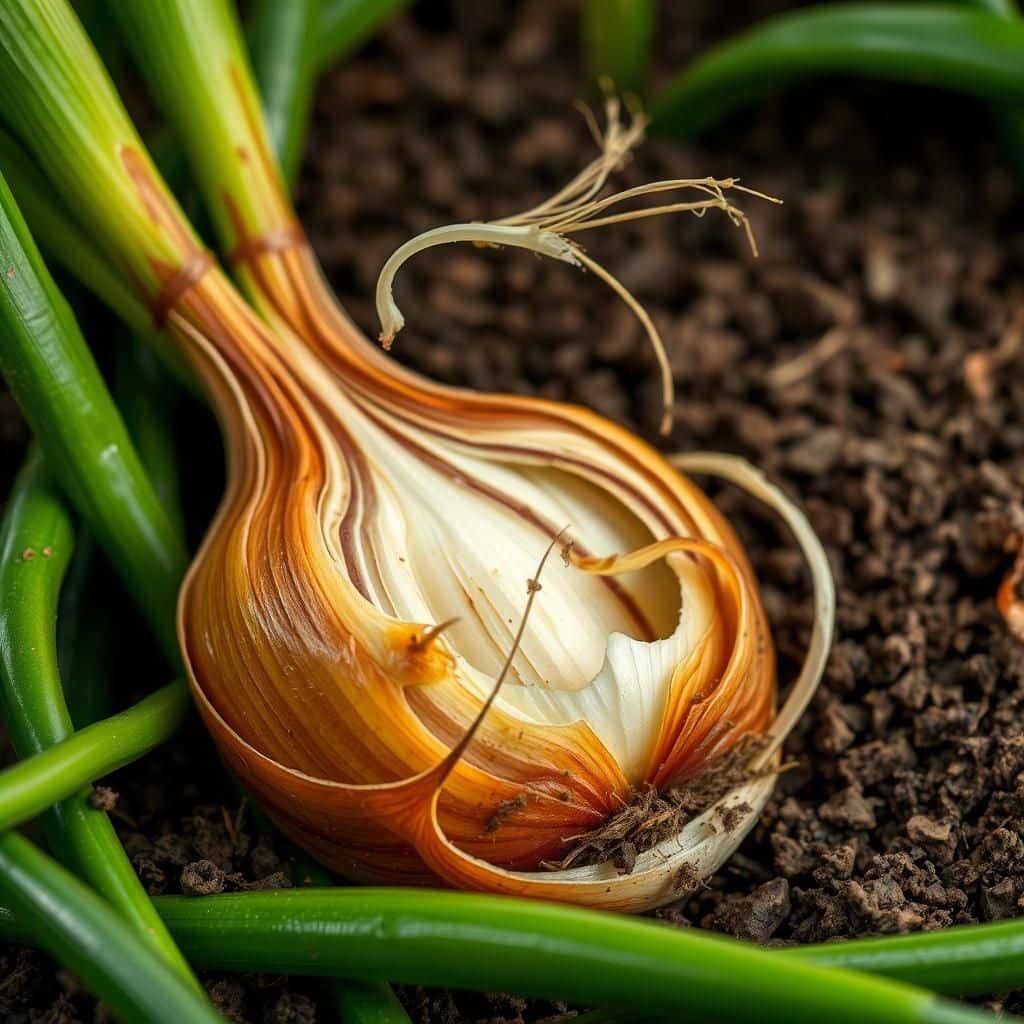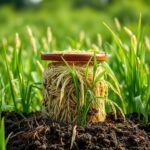Can Onion Peels Be Composted? Discover the Benefits and Tips for Your Garden

Onion peels, often discarded as kitchen waste, hold surprising potential for composting enthusiasts and gardeners alike. These papery outer layers not only contribute valuable nutrients to compost but also offer additional benefits such as pest deterrence and improved soil health. In this article, we will explore the advantages of composting onion peels, including their high fiber content and ability to enrich your garden’s ecosystem. Additionally, we’ll provide practical tips on how to effectively incorporate onion peels into your compost pile, ensuring you make the most of this often-overlooked resource. Discover how simple changes can enhance your gardening experience.
Can Onion Peels Be Composted?
Yes, onion peels can indeed be composted and are a valuable addition to your compost pile. These scraps are rich in nutrients and help in the overall breakdown process, contributing to the organic matter that enriches your soil. However, it's important to note that while onion peels are compostable, they should be added in moderation due to their natural oils, which can potentially repel some beneficial microorganisms. Ensuring a well-balanced mix of green and brown materials in your compost will facilitate efficient decomposition and optimize nutrient availability in the finished compost.
Benefits of Composting Onion Peels
Composting onion peels provides several essential benefits. They are a rich source of carbon and contain micronutrients such as potassium, calcium, and magnesium. When added to the compost, they not only help in providing these nutrients for plants but also improve soil structure and moisture retention. Moreover, utilizing kitchen scraps like onion peels helps in reducing waste sent to landfills, supporting a more sustainable approach to waste management.
How to Prepare Onion Peels for Composting
To effectively compost onion peels, it's crucial to chop or shred them into smaller pieces. This increases the surface area, allowing for faster decomposition. Additionally, it's advisable to avoid composting large quantities of peels at once. Instead, mix them with other kitchen scraps like vegetable and fruit waste, along with brown materials like dried leaves or cardboard, to create a balanced compost mix that fosters a healthy microbial environment.
Potential Issues with Composting Onion Peels
While they can be composted, onion peels may pose some potential issues. The strong odor emitted during the decomposition of onion peels can attract unwanted pests to your compost pile. Furthermore, their natural oils may inhibit the growth of certain beneficial bacteria if not mixed properly. To mitigate these concerns, ensure that onion peels are well-mixed with a variety of other compost materials to help mask the smell and balance the compost.
See also:
Best Practices for Composting Onion Peels
When composting onion peels, it's best to practice moderation. Mixing peels with an ample amount of browns like straw or shredded newspaper will create a balanced composting environment. Maintaining proper moisture levels and aeration within the compost pile is also essential to promote healthy microbial activity. Regularly turning the compost can help speed up the breakdown process and ensure uniform decomposition throughout the pile.
Recognizing Finished Compost with Onion Peels
To determine if your compost is ready, look for a dark, crumbly texture that no longer resembles its original ingredients. Though onion peels will decompose over time, some fibers may remain visible. This is generally acceptable as long as the compost is rich in nutrients and has a balanced texture. The finished compost should also have an earthy smell, indicative of its readiness to nourish your garden or plants.
| Aspect | Details |
|---|---|
| Texture | Dark, crumbly, not resembling original materials |
| Odor | Earthy smell, free from strong odors |
| Fiber Visibility | Some remnants of onion peels may be visible |
| Moisture Level | Should be evenly moist, but not soggy |
| Nutrient Content | Rich in nutrients, promoting healthy plant growth |
Advantages of Composting Onion Peels for Your Garden
Composting onion peels is an excellent way to enrich your garden's soil with essential nutrients. These peels are rich in potassium, calcium, and other minerals that can improve soil structure and promote healthy plant growth. Additionally, when added to your compost pile, onion peels break down and contribute to the overall microbial diversity, enhancing the compost's fertility. This natural process helps to create a balanced compost mix, which is crucial for sustaining healthy garden ecosystems.
Understanding the Nutritional Value of Onion Peels
Onion peels contain a variety of nutrients that can be beneficial for plants. They are high in flavonoids, which can help protect plants from pests and diseases while also boosting the plant's immune system. These compounds act as natural antioxidants, which can promote overall plant health. By composting onion peels, gardeners can recycle these nutrients, ensuring that their plants benefit from an abundant source of organic matter.
How to Compost Onion Peels Effectively
To compost onion peels effectively, it is important to chop them into smaller pieces, which will speed up the decomposition process. Layer them into your compost pile along with a good mix of greens (like grass clippings) and browns (like dried leaves) to maintain a proper carbon-to-nitrogen ratio. Ensuring aeration by turning the pile regularly will help to break down the peels more efficiently and prevent any unpleasant odors from developing.
See also:
Considerations When Composting Onion Peels
While onion peels are generally safe for composting, it's essential to be cautious about quantity. Adding too many onion peels at once can lead to a high sulfur content in your compost, which might cause strong odors and attract unwanted pests. Additionally, if you are using a traditional composting method, limiting the number of peels to a few handfuls at a time will help maintain a balanced composition without overwhelming the microorganisms that are crucial for the composting process.
Potential Drawbacks of Composting Onion Peels
One potential drawback of composting onion peels is that they can take longer to decompose compared to other kitchen scraps. Their tougher texture may slow down the breakdown process, especially if they are added in large amounts. Furthermore, if not adequately mixed into the pile, they might form layers that impede air circulation, which is vital for effective composting. Monitoring the moisture levels and ensuring a good mix will help alleviate these issues.
Using Onion Peels Beyond Composting
In addition to composting, onion peels can be used in other creative ways within the garden. For example, they can be used as a natural dye for fabrics or even as a pest repellent when steeped in water to create a spray. Furthermore, some gardeners utilize them to enhance the color and flavor in homemade broths. Exploring these alternatives can provide additional benefits while minimizing waste.
Questions from Our Readers
Can onion peels be composted?
Yes, onion peels can be composted. They are considered a valuable organic material that contributes to the overall nutrient content of the compost. However, it's essential to note that they should be added in moderation to avoid any potential issues with the compost pile.
What are the benefits of composting onion peels?
Composting onion peels can provide several benefits, including enriching the soil with essential nutrients such as potassium and phosphorus. These nutrients support plant growth and enhance soil health, making your compost more effective for gardening and landscaping purposes.
See also:
Do onion peels attract pests in compost?
While onion peels are not the primary attractants for pests, they can sometimes attract unwanted insects if not composted correctly. To minimize this risk, ensure that the compost pile is well-aerated and balanced with a variety of materials to deter pests.
Is there any preparation needed before composting onion peels?
Before composting onion peels, it is advisable to chop or shred them into smaller pieces. This practice accelerates the decomposition process and allows for a more even distribution of nutrients within the compost.

If you want to read more articles like Can Onion Peels Be Composted? Discover the Benefits and Tips for Your Garden, we recommend you check out our Compost category.
Leave a Reply
Related Articles